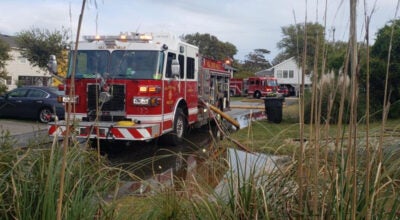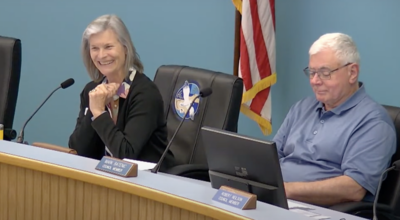Career/Technical Education moves forward in Dare County
Published 2:37 pm Sunday, February 11, 2018
In two different venues, Career and Technical Education is a topic of conversation.
At Dare County’s College of The Albemarle Task Force meetings, business leaders have asked for specific courses to help existing economic sectors in the county.
For Dare’s Board of Education, an in-depth look at Career and Technical Education was provided at the delayed January board meeting.
In both venues, decision makers and program leaders are making course decisions for jobs that may exist now but will also be created in the future.
In Dare County Schools, the Career and Technical Education, CTE, program is growing in course offerings and student participation. The following information is retrieved from a presentation by Jean Taylor, Director of Career and Technical Education for Dare Schools.
Some 42 CTE courses are available in Dare Schools Program of Study. During course registrations, students at each of the Dare County high schools could sign up for the same courses. This year, 72 percent of Dare high school students are taking one or more CTE courses.
Those course are offered in 13 Career Cluster areas, including Agriculture, Food and Natural Resources; Architecture and Construction; Arts, AV, Technology & Communication; Business Management and Administration; Finance; Health Science; Human Services; Hospitality and Tourism; Information Technology; Law, Public Safety, Corrections and Security; Manufacturing; and Marketing.
In the Dare CTE program, students can earn real world experience through internships. This year, 35 students are working as interns.
The internship experience is structured to provide one honors credit. It must have 135 “target” contact hours. The internship can be paid or unpaid but is based on a formal agreement. The student prepares a portfolio and presentation. The internship can be offered in the summer.
Career development coordinators in all three high schools coordinate internships and a host of other programs associated with Career and Technical Education.
Additional work-based learning opportunities include Career Shadowing, Guest Speakers, Service Learning, Field Trips, College/Career Fairs/STEM Day, Students at Work Week and Take Your Sons and Daughters to Work Day.
This term, all sixth grade students in Dare Schools participated in Take Your Sons and Daughters to Work Day.
“We are fortunate to have so many active business CTE partners throughout the district,” reported a grateful Jean Taylor.
Career and Technical Education courses are offered in grades 6, 7, and 8 at all three middle grades locations. Courses are delivered in various ways, semester, or year-long depending on the location and teacher availability. About 67 percent of Dare middle school students are taking at least one CTE course.
All three middle schools offer courses in Technology Design and Innovation and Computer Skills and Applications.
Cape Hatteras middle grade students can also take Exploring Environment and Natural Resources. At Manteo Middle, Exploring Career Decisions and Coding are offered. At First Flight, Exploring Business and Marketing is a third course.
Coding is taught at Manteo Middle School to 8th grade students during second semester as part of a newly received grant. Dare Schools will apply for additional funding to expand the program to Cape Hatteras and First Flight middle schools.
Some 18 CTE courses offered to high school students lead directly to industry credentials or certification.
The newest course offered is Public Safety I and II. When this course is finished at the second level, students are FEMA Certified.
A strong business partner made the course available. An officer with Kill Devil Hills Police Department is the instructor at First Flight High School. Public Safety is also taught at Manteo but the course did not make at Cape Hatteras.
Last year, 286 credentiald were earned by students. The courses offered and the credential or certification earned are:
Nursing Fundamentals: Credential, NC Nurse Aide I
Marketing Management: Customer Service and Sales Certification
Hospitality and Tourism: Advance Customer Serve and Sales Certification and Certified Guest Service Professional
Welding I: OSHA 10-Hour Certification
Carpentry I, II and Core and Sustainable Construction: NCCER Credential and OSHA 10-Hour Certification
Adobe Visual Design: Adobe Photoshop, InDesign, Illustrator
Adobe Digital Design: Adobe Dreamweaver
Public Safety I: National Incident Management System 100 and 200
Public Safety II: FEMA Certified
For years under an articulated agreement, students who prove proficient in offered CTE courses can earn high school and community college credit. To earn the college credit, the student must earn at least a B in course work and a minimum of 93 on the post-assessment.
The dual credit is offered in 21 CTE courses. Currently, 140 students are projected to earn college credit through this CTE program, which includes courses in these areas: Introduction to Culinary Arts; Culinary Arts I and II; Health Science I; Foods I and II; Foods II and ServSafe Certification; Marketing; Hospitality and Tourism; Personal Finance; E-Commerce I; Multimedia and Webpage Design; Microsoft Word, PowerPoint, Publisher; and Construction Technology I & II.
Students in high school Career and Technical Education programming also have the opportunity to participate in various Career Technical Student Organizations or co-curricular events. Those student events span the country with regional, state and national competitions and conferences.
Familiar organizations are DECA (marketing, management and entrepreneurship); FCCLA Family, Career and Community Leaders of America; Skills USA, concentrating on trades, technology and skilled occupations; FBLA, Future Business Leaders of America; and HOSA Future Health Professionals, formerly known as Health Occupations Students of America.
In both Dare County Schools and College of The Albemarle, Career and Technical Education programs can be offered but student course decisions dictate which programs go forward.




